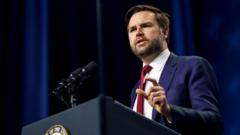During her visit to the US, Italian Prime Minister Giorgia Meloni aims to persuade President Donald Trump to consider a "zero-for-zero" tariffs deal for the EU. Despite the challenges, her close relationship with Trump could play a crucial role in shaping future trade policies between Europe and the US.
Meloni's Diplomatic Balancing Act in Washington

Meloni's Diplomatic Balancing Act in Washington
Italy's PM Giorgia Meloni embarks on a sensitive mission to negotiate US tariffs while maintaining EU solidarity.
Italian Prime Minister Giorgia Meloni has landed in the United States for a pivotal meeting with President Donald Trump, where she faces the challenging task of balancing Italy's national interests with those of the European Union. Scheduled to meet for discussions at the Oval Office after a luncheon, Meloni's visit marks her as the first European leader to engage with Trump since he suspended new tariffs on the EU, initially announced at 20% in early April.
Meloni's home country, Italy, is particularly at risk amid any shifts in US trade policy as 10% of its exports, approximately €67 billion ($76 billion), are directed to the US, its third-largest trading partner outside the EU. Following Trump's earlier tariff announcements, Italy's growth forecast was adjusted downward, highlighting the gravity of the situation. Prior to her departure, Meloni acknowledged the complexities ahead, stating, "We know this is a difficult time. We will do our best – I am aware of what I represent and of what I am defending."
Given her current political standing and original ties with Trump, Meloni appears to be in a strategic position to influence US policy. Her relationship with Trump, praised by both in prior statements, positions her uniquely among European leaders—both ideologically and politically. She has historically aligned with Trump's views on issues such as migration and criticizes "globalist elites," reflecting a bond that has remained largely unbroken since she assumed office in 2022.
Riccardo Alcaro from the Italian Institute for International Affairs underscores Meloni's belief that Europe should avoid severing relationships with the US. If Trump remains firm on tariffs, she may concede to agreeing on counter-tariffs while prioritizing diplomatic adaptability. Alcaro further emphasized that Meloni resonates more closely with Trump's allies than many of her European counterparts.
Despite some skepticism from other European nations, particularly France, where concerns were raised about bilateral negotiations that might foster divisions among EU member states, the European Commission has expressed support for Meloni’s outreach efforts. A spokeswoman confirmed that Meloni’s discussions are aligned with an overall European strategy and stressed the necessity that trade negotiations reflect the EU’s collective interests.
Meloni's mission, while primarily focused on negotiating a possible zero-tariff agreement and encouraging American imports, may also involve subtle discussions about Europe maintaining a stance against China. Amid growing domestic political pressure, her allies lauded her courage for taking on such a responsibility, while opposition figures raised alarms over her potential alignment with Trump, wondering if she would prioritize American interests over Italian or European unity.
As Meloni prepared for her crucial engagement in Washington, she quipped humorously about the pressure of the undertaking. "As you can imagine," she remarked, "I'm feeling no pressure at all." With both opportunities and challenges ahead, Meloni’s diplomatic balancing act will be closely watched by both admirers and critics alike within Europe.




















